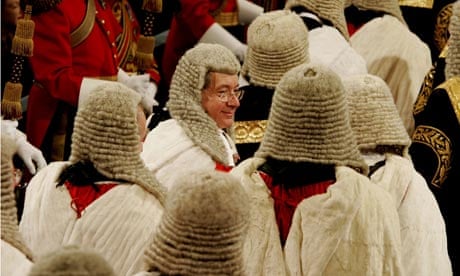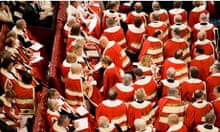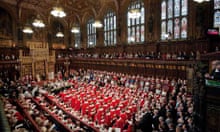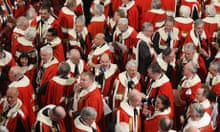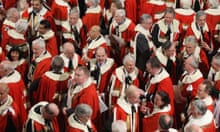Our second chamber is bursting at the seams. The 30 new members appointed to the Lords are the latest additions to an increasingly bloated house. Electoral Reform Society research suggests that the total number of peers could rise to as many as 2,000 after the next general election. That is an awful lot of unelected politicians, outnumbering elected MPs by three to one.
This is not only wrong in principle; it also doesn't work in practice. The House of Lords is an ancient institution creaking its way into the 21st century, and its infrastructure will struggle to cope with this latest influx. Matters were already so out of hand that peers were struggling to find space for a desk. Now there are 785 lords, and only about 400 seats in the Lords chamber. The only reason the show goes on is because not all peers are regular attendees.
This excess of lords would be less of a problem if all these new members were the sort of expert that opponents of reform claim populate the lords. The argument is that making appointments to the second chamber allows high-quality, non-partisan individuals to be involved in making our laws, and that elections would serve only to create a political replica of the House of Commons.
But these new appointments show the weakness of that argument. Of the 30 new peers, 18 have either held or sought public office, or have worked for politicians or parties. Once again, the second chamber is being stuffed with party apparatchiks.
This government has introduced 64 partisan peers since 2010; the previous Labour government filled the Lords with 173 of their number.
Received wisdom in Westminster is that reform of the House of Lords has been killed off for the foreseeable future. Last year, when David Cameron failed to get his party behind the proposal for a predominantly elected second chamber, it certainly looked that way. And reformers have reason to be pessimistic: the promise of an elected chamber has been routinely denied by similar party-political deadlock for over a century.
But as the house gets ever larger, reform becomes more and more inevitable. Even die-hard enthusiasts for an appointed second chamber have to recognise the unsustainability of the current system. A smaller chamber might be able to get away with the defence that it's at least good value. A super-sized chamber that costs £109m per year and where members can clock on, claim £300 and go home again cannot last. By failing to exercise restraint, parties have forced the system to the brink.
As soon as the government cottons on to the fact that something has to be done, then the reform agenda is back on the table. No matter who is at the helm after the next general election, they will have to deal with the fact that the House of Lords is becoming unsustainable. It is already the second-largest chamber in the world – only the National People's Assembly of China can compete.
Party leaders should be preparing for the moment when the penny drops. All three main parties ought to be talking to each other to thrash out a deal on Lords reform in time for the next general election. For those of us who believe we should be able to choose our own legislators rather than have them thrust upon us, this moment cannot come soon enough.
